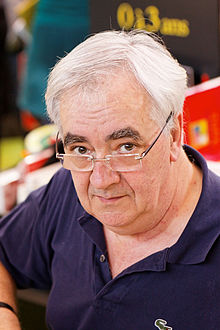|
Claude Ponti
Claude Ponticelli, known as Claude Ponti, was born on November 22, 1948, in Lunéville (Lorraine, France). He is a children's author and illustrator. His books are known for lush visual design and illustrations, alongside imaginative and poetic stories, showcasing Claude Ponti's skills as an iconic and complete artist, with a unique and distinctive universe. BiographyClaude Ponti was born the youngest of three children.[citation needed] His father was a “chrono-analyst” (or Time-motion study analyst), and his mother was a teacher. At six years old, Claude Ponti was raped by his maternal grandfather, a World War 1 veteran. Traumatised, he only opened up years later, at 25 years old. His parents refused to believe him, and kicked him out of the house.[1] Having got his diploma in 1967, Claude Ponti then attended a Fine Arts school in Aix-en-Provence. Later, he also studied literature and archaeology in Strasbourg, before eventually moving to Paris. He worked as a newspaper cartoonist, for the French newspaper L'Express, from 1968 to 1984. During that time, he also painted and displayed his works at a gallery in Paris, from 1972 to 1978. Also, he gave some illustrations to the children literature editor. In the early 1980's, he was the artistic director of the Imagerie of Épinal. The birth of his daughter, Adèle, in 1985, was the trigger for his career as children's author. At first, his works were only for his child. The first one, “Adele's Album”, was published in 1986 by Gallimard. Since then, most of his books have been published by L'École des loisirs. In 2009, he created Le Muz,[2] an online virtual museum, which shows works of children from the entire world."Le Muz". lemuz.org (in French). Retrieved 2017-05-25. Claude Ponti writes novels for adults too, even if he's more known for his children's author works.[3][4] Works
WritingClaude Ponti creates stories which are articulated like dreams, often with a touch of humour. He frequently invents new words, inspired by kids (bad pronunciation, or their imaginations). He also plays with the language, by use of subtle and poetic puns. Hence, the content is both for kids and adults, especially in his last few works. Puns contribute to the writing dynamic, and characters are created through associating ideas. The whole book, story and images, is a base to imagine and create new psychological interpretations. Besides, a lot of books tells the adventure of characters who live initiatory journeys. Ponti says the following on his own books : « My stories are like tales, always in the fantasy, they talk about the « inside life » and childhood feelings, so each child can put what he wants into the images : dreams and characters of his own. » IllustrationIn Ponti's albums, text is tied to images. The gorgeous illustrations are full-blown elements, symbolic and independent. The attentive reader can discover details, easter eggs, hidden messages, or facts not mentioned in the text. InspirationsClaude Ponti is notably inspired by Lewis Carroll's wacky universe, and introduces references to Alice's Adventures in Wonderland and Through the Looking-Glass in his own books. Furthermore, children's imagination inspired him, their ideas, their wishes, to create appreciated books : « When my daughter had a dream or a nightmare, the next day, I asked her to tell me about it, I was taking notes then I went to my office, and I worked. » Renown
According to Anne Dupin, « Claude Ponti is to my mind a vital author in the whole children’s production, including the abundant creativity and the fanciful graphic nearly brings kids infatuation. His universe, with these multiple artistic and cultural references, themes and a languages proper to the childhood, his originality through forms, colors, typography, or pagination, brings narrative content that suits to the children’s emotional, and their expectations. They can find a new knowledge or word, which let them choose easily their destinies. »[5] InternationalNowadays, Claude Ponti's albums are translated into 13 languages, including English, Spanish, German, Greek and Swedish. Russian publishing houses are starting to pay attention to the author, while Chinese and Korean people are nearly fanatical concerning him. [citation needed] According to Isabelle Darthy, who was the author's publisher in 1990: “Claude Ponti is a headache for his translators. Even in French, plenty of things are missed; the reader must read a second or a third time to understand. The albums aimed to the international public need pretty good translations, because Claude Ponti's puns and expressions are complex, and often subtle. Translating those books required very experienced translators, and even fans of the author.”[6] Prizes and awards
Bibliography
Novels for adults
Novels for children
Theater plays
References
|
||||||||||||||||||
Portal di Ensiklopedia Dunia
